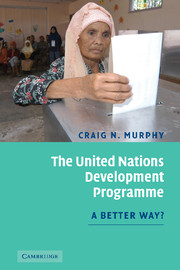Book contents
- Frontmatter
- Contents
- List of figures
- List of tables
- Foreword by Kemal Dervis
- Acknowledgements
- 1 Not the standard image
- 2 Development and the United Nations
- 3 Institutions for practical solidarity
- 4 Decolonization and economic transformation
- 5 Lewis in Ghana and after
- 6 Capacity, consensus, crisis, and consequences
- 7 Engaging liberation movements and revolutionary states
- 8 A learning organization: women, Latin America, and Africa
- 9 ‘Bottoms up’ development helps make UNDP a mammal
- 10 Working for ‘a holy man’ after the cold war
- 11 ‘Fabian socialists do not make the cut’
- 12 ‘Ploughing the sea’? UNDP and the future of global governance
- Index
8 - A learning organization: women, Latin America, and Africa
Published online by Cambridge University Press: 08 January 2010
- Frontmatter
- Contents
- List of figures
- List of tables
- Foreword by Kemal Dervis
- Acknowledgements
- 1 Not the standard image
- 2 Development and the United Nations
- 3 Institutions for practical solidarity
- 4 Decolonization and economic transformation
- 5 Lewis in Ghana and after
- 6 Capacity, consensus, crisis, and consequences
- 7 Engaging liberation movements and revolutionary states
- 8 A learning organization: women, Latin America, and Africa
- 9 ‘Bottoms up’ development helps make UNDP a mammal
- 10 Working for ‘a holy man’ after the cold war
- 11 ‘Fabian socialists do not make the cut’
- 12 ‘Ploughing the sea’? UNDP and the future of global governance
- Index
Summary
Morse's UNDP did begin to challenge a nation's ‘right to develop’, not by ignoring it, but by laying the foundations for the assertion of an individual's development rights and of the need for a democratic, capable, and autonomous state to assure them. Three Programme innovations of the 1980s laid the foundations on which Sustainable Human Development and the Millennium Development Goals (MDGs) – the eventual guides for UNDP's work – would be built. UNDP's engagement with the Women in Development movement, and the embedding of the UN Development Fund for Women (UNIFEM) within UNDP, helped shift the locus of the Programme's attention from countries to individuals. The particular focus of the Latin American Bureau on democratization anticipated a similar change in the focus of the Programme as a whole. At the same time, the Bureau piloted new kinds of partnerships with government that would make UNDP's promotion of democratic governance effective. Finally, in Africa, in response to the economic crises of the 1980s and the attempts to impose a single, formulaic response (the so-called ‘Washington Consensus’), UNDP helped to build regional and national capacities to devise alternative strategies that could more effectively protect vulnerable persons.
The stories of the setting of each of these three cornerstones have to be told somewhat separately, because that is how they began: as the innovations of one or another relatively autonomous part of UNDP.
- Type
- Chapter
- Information
- The United Nations Development ProgrammeA Better Way?, pp. 199 - 231Publisher: Cambridge University PressPrint publication year: 2006



